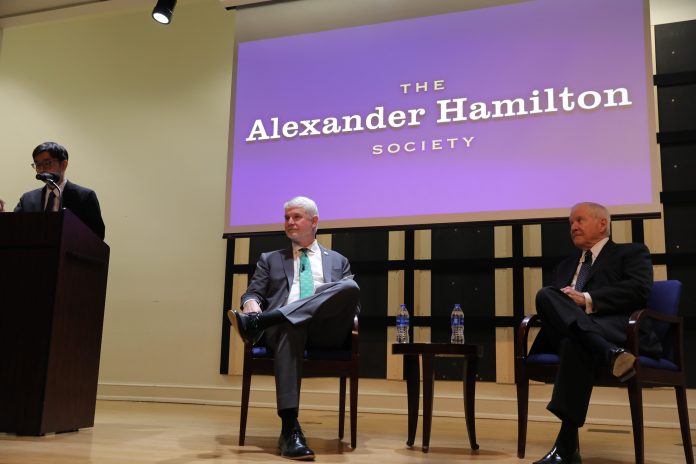Thursday, Feb. 8, the College of William and Mary’s Alexander Hamilton Society chapter hosted “Gates: American Grand Strategy,” a discussion with College Chancellor Robert M. Gates ’65, L.H.D. ’98 and George and Mary Hylton Professor of International Relations and Director of the Global Research Institute Michael Tierney ’87.
Tierney began the discussion expressing appreciation toward AHS and Gates for their dedication in the event.
“I’ve been here for 28 years as a faculty member, and I was a student here a long time ago. And there have been no chancellors that show up, engage students in the same way that Chancellor Gates has, so I appreciate that,” Tierney said.
In the discussion, Gates remarked that China, while wanting to retain the benefits of the current world order, also desires to establish a new one.
“I think China seeks a world in which they are dominant in Asia,” Gates said. “They have pushed the U.S. out of the western Pacific, and they are the leading global power. It is a world that allows them to take over Taiwan and to assert their sovereignty over the Nine-dash line and the South China Sea, which basically takes territories that belong to the Philippines, Indonesia, Malaysia, Vietnam and others, for exploitation, fishing, mining, etc.”
Gates expanded on the idea, asserting that China wants to showcase its dominance through military and economic strength.
“It is a world in which nations mind their own business and don’t ask awkward questions about internal affairs of other countries,” Gates said. “It is a world in which might makes right. And it is a world that is open for Chinese economic expansion and growth.”
Referring to Gates’s article in Foreign Affairs magazine, Tierney asked Gates about his thoughts on who is to blame for the United States’ domestic dysfunction that is leading to an unstable world order.
“I think the problem on the Hill now is not bad leadership, but weak leadership,” Gates said. “None of the leaders in Congress have the power to make something happen. And this is a result of changes that have taken place in the Congress over the last number of years.”
Gates pointed to reforms in Congress as the culprit, like the election of committee chairs and the abolition of earmarks, which have weakened the power of congressional leaderships.
One of the problems of Congress post-Watergate, he remarked, is ironically its democratization.
“And the irony of all these reforms is that over the decades, they have shifted more and more and more power to the executive branch because the Congress cannot act,” Gates said. “I’ll just give you one example of a sore spot for me, for obvious reasons. The Department of Defense has not had an enacted appropriations bill at the beginning of the fiscal year, 1st of October in 14 years. That’s a complete breakdown of the appropriations process, and it has a catastrophic effect.”
Tierney and Gates also discussed the protest which interrupted a panel he participated in during December 2023.
“So, as director of Central Intelligence and Secretary of Defense, it was not exactly my first protest,” Gates said. “I would say that [the] protest that took place in December was probably the most polite and orderly I have ever seen. And what I had thought — one of the things that I thought was great about it actually, was they made their point and then followed the rules and then moved on when they were asked to, so that the rest of the audience could experience the program. So they didn’t infringe on anybody else’s rights, but they had the opportunity to make their point and then moved on. And it seems to me that’s kind of the essence of what protests ought to be, at least on university campuses.”
“I would say that [the] protest that took place in December was probably the most polite and orderly I have ever seen.”
Attendee Aileen Weber, a local Williamsburg resident, remarked that students were fortunate to have Gates as chancellor. She also inquired at the event about the current role of the United Nations. Gates explained the UN still serves a purpose, though it works best when the interests of the five nations who are permanent members of the Security Council are aligned.
“I think that U.S. leaders need to have a realistic appreciation of what the UN can do,” Gates said. “And the UN may potentially have some role in the Middle East, because frankly, I think, the five permanent members of the Security Council, figuring out some way to calm down the Middle East, may be a shared interest at some point.”
AHS President Junie Park ’25 reflected on the event in an email to The Flat Hat.
“I think the event went spectacularly well!” Park wrote. “Turnout was unprecedented. Our RSVP form surpassed the number of seats the day before the event, with over 160 RSVPing for our event. We could not possibly count how many actually came to the event, but a very very rough estimate seems to be well over 200 people attempting to come to the event. A large number of people had to be unfortunately turned away because the room just simply couldn’t hold any more people, but I’m confident they won’t be that disappointed in missing out, as we will have many more events coming up this semester.”
The next AHS featured speaker will be Center for Strategic and International Studies Daniel F. Runde, which will focus on American soft power and international aid. The event will take place Tuesday, Feb. 20 in Blow Memorial Hall.

